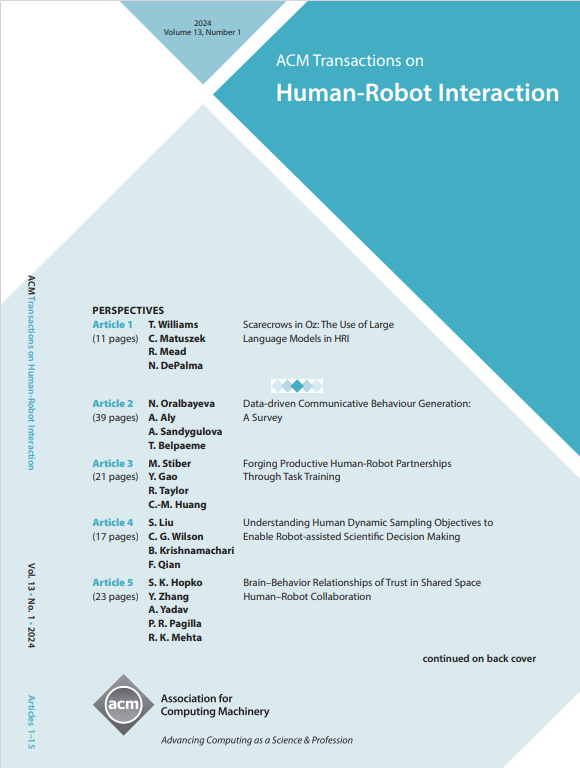人类信任与自信耦合动态的计算模型
IF 5.5
Q2 ROBOTICS
引用次数: 2
摘要
能够帮助人类完成日益复杂任务的自主系统正变得无处不在。此外,已经确定的是,一个人决定依赖这样的系统是他们对系统的信任和他们自己的自信的功能,因为它涉及到执行感兴趣的任务。鉴于对自动化的过度依赖和过度依赖都可能给人类带来重大风险,因此有动机开发能够适当校准人类信任或自信的自主系统,以实现适当的依赖行为。本文提出了一个人的信任与自信耦合动态的计算模型。动态建模为部分可观察的马尔可夫决策过程,没有奖励函数(POMDP/R),利用行为和自我报告数据作为估计这些认知状态的观察。该模型使用从340名参与者收集的数据进行训练和验证。对转移概率的分析表明,所提出的模型捕获了高、低信任和自信的所有离散组合的信任、自信和依赖之间的概率关系。利用所提出的模型设计最优策略以促进信任和自信校准是未来工作的目标。本文章由计算机程序翻译,如有差异,请以英文原文为准。
A Computational Model of Coupled Human Trust and Self-confidence Dynamics
Autonomous systems that can assist humans with increasingly complex tasks are becoming ubiquitous. Moreover, it has been established that a human’s decision to rely on such systems is a function of both their trust in the system and their own self-confidence as it relates to executing the task of interest. Given that both under- and over-reliance on automation can pose significant risks to humans, there is motivation for developing autonomous systems that could appropriately calibrate a human’s trust or self-confidence to achieve proper reliance behavior. In this article, a computational model of coupled human trust and self-confidence dynamics is proposed. The dynamics are modeled as a partially observable Markov decision process without a reward function (POMDP/R) that leverages behavioral and self-report data as observations for estimation of these cognitive states. The model is trained and validated using data collected from 340 participants. Analysis of the transition probabilities shows that the proposed model captures the probabilistic relationship between trust, self-confidence, and reliance for all discrete combinations of high and low trust and self-confidence. The use of the proposed model to design an optimal policy to facilitate trust and self-confidence calibration is a goal of future work.
求助全文
通过发布文献求助,成功后即可免费获取论文全文。
去求助
来源期刊

ACM Transactions on Human-Robot Interaction
Computer Science-Artificial Intelligence
CiteScore
7.70
自引率
5.90%
发文量
65
期刊介绍:
ACM Transactions on Human-Robot Interaction (THRI) is a prestigious Gold Open Access journal that aspires to lead the field of human-robot interaction as a top-tier, peer-reviewed, interdisciplinary publication. The journal prioritizes articles that significantly contribute to the current state of the art, enhance overall knowledge, have a broad appeal, and are accessible to a diverse audience. Submissions are expected to meet a high scholarly standard, and authors are encouraged to ensure their research is well-presented, advancing the understanding of human-robot interaction, adding cutting-edge or general insights to the field, or challenging current perspectives in this research domain.
THRI warmly invites well-crafted paper submissions from a variety of disciplines, encompassing robotics, computer science, engineering, design, and the behavioral and social sciences. The scholarly articles published in THRI may cover a range of topics such as the nature of human interactions with robots and robotic technologies, methods to enhance or enable novel forms of interaction, and the societal or organizational impacts of these interactions. The editorial team is also keen on receiving proposals for special issues that focus on specific technical challenges or that apply human-robot interaction research to further areas like social computing, consumer behavior, health, and education.
 求助内容:
求助内容: 应助结果提醒方式:
应助结果提醒方式:


